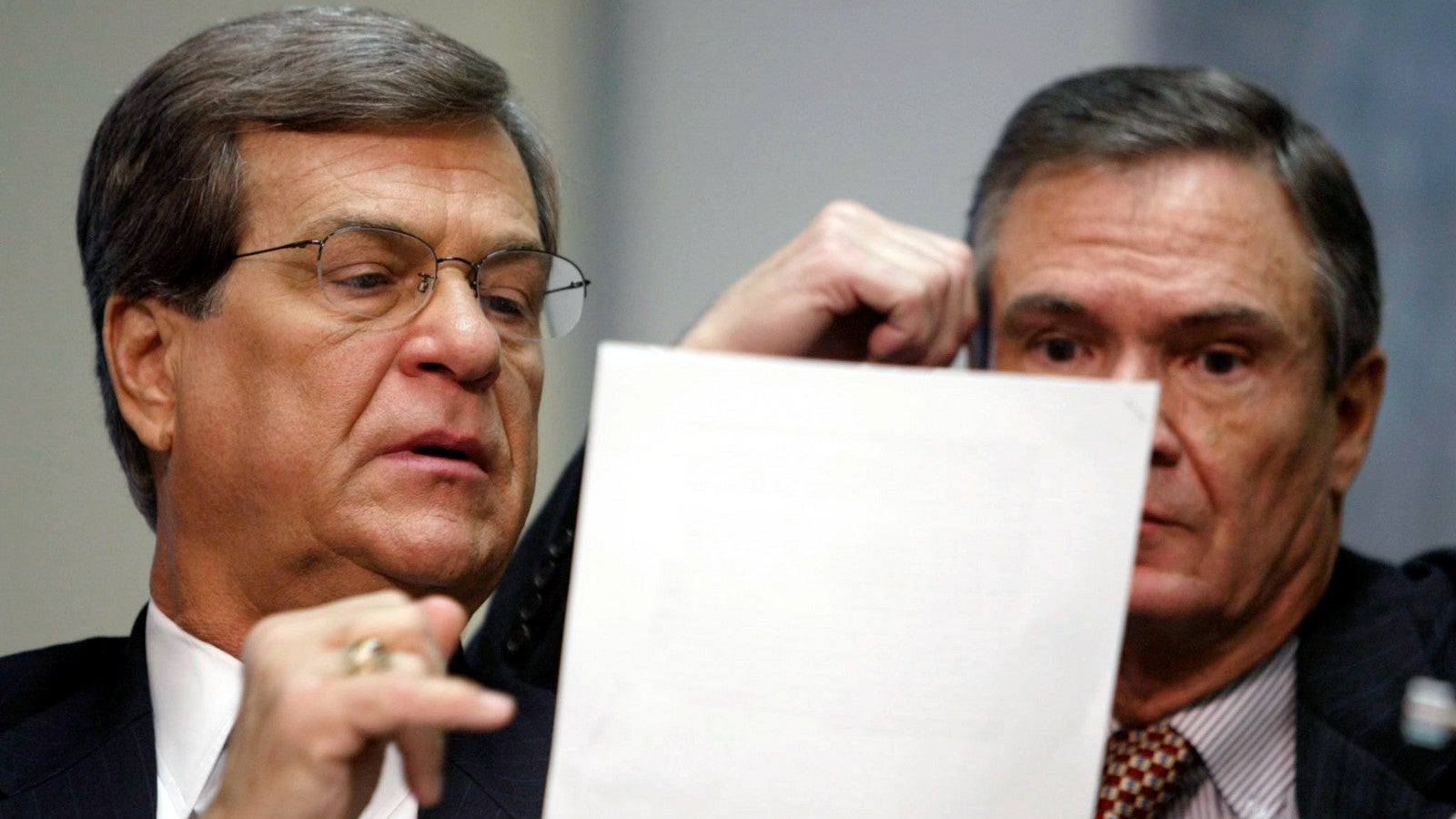A recent history of Russia’s efforts to buy influence in US politics
This item has been updated.


This item has been updated.
Two prominent US politicians-turned-lobbyists, Trent Lott and John Breaux, are the latest weapon in Russia’s simmering conflict with the West. Lott and Breaux were hired by Gazprombank, a financial institution controlled by Russia’s state oil company, to lobby against economic sanctions leveled on the firm by the US. (The sanctions are meant to deter Russian buccaneering in Ukraine.)
Representing Russia’s complex relationship with the US is no easy task, but the two former lawmakers will be paid hundreds of thousands of dollars to employ their good names, if past experience is any indicator. Nor is success guaranteed, as the following perusal of recent Russian efforts to sway US policy shows:
TASK: Obtain a visa for an oligarch interested in buying a US auto company.
Oleg Deripaska is one of the richest men in Russia, an oligarch who assembled his fortune during Russia’s post-USSR “aluminum wars,” an intense battle for the state’s industrial resources. In 2006, he was reportedly considering a bid for American auto-maker Chrysler, but his visa to visit the United States was revoked, reportedly due to concerns about possible connections to organized crime. Allegations of such connections were highlighted at the time by a lawsuit brought by a former business associate, Michael Cherney, alleging that Deripaska stole his share of a business. The lawsuit was settled out of court in 2012 and Deripaska’s lawyers maintained he was the victim of Cherney’s attempt to extort him. Deripaska has denied any connection to organized crime.
At the time, the US state department didn’t comment on the reason his visa was denied. US diplomats in Moscow alleged in a 2006 cable uncovered by Wikileaks that “Deripaska enjoys a favorable relationship with President Putin—he is a more or less permanent fixture on Putin’s trips abroad, and he is widely acknowledged by our contacts to be among the 2-3 oligarchs Putin turns to on a regular basis.” Another cable from 2010 shows Deripaska’s critics had the ear of the US government, with a former close associate openly critical of Deripaska’s business practices.
A Deripaska representative provided this statement to Quartz: “Mr. Deripaska is the Chief Executive Officer of UC Rusal, a publicly traded company and the world’s largest aluminum producer with over 70,000 employees in 19 countries. A Rusal spokesperson noted that, ‘Mr. Deripaska has been the driving force behind Rusal’s development into the modern and efficient company it is today. He is a knowledgeable and respected businessman and commentator whose views are sought throughout the world by many organizations, both public and private.'”
In 2009 and 2010, Russia hired the Endeavour Group and its founder, Adam Waldman, to get a US visa for Deripaska, who by this time was focused on a deal to acquire General Motors’ European operations. Deripaska paid the firm a $40,000 monthly retainer, and Russia’s foreign minister wrote a letter to Waldman encouraging his efforts. “Mr. Deripaska was granted a US visa to travel to the US in 2009, and he has visited the US at least annually since then, each time on a valid US visa,” says Waldman.
TASK: Help Russia make a good impression on the international stage.
Russia hired public relations firm Ketchum Inc. to provide “communications support” when it hosted the G8 summit for the first time in 2006, paying $2 million upfront. Apparently, all went well: The summit was overshadowed by the outbreak of war between Israel and Lebanon, and the biggest controversy was a hot mic moment where then-US president George W. Bush complained about Syria’s inability to convince Hezbollah to “stop doing this shit.” Ketchum was hired back again in 2007, given $845,000 to help smooth Russia’s path into the World Trade Organization, which went off without a hitch.
TASK: Keep tabs on US lawmakers.
The venerable law firm Alston & Bird has been on a $15,000 to $35,000 monthly retainer from Russia since 2009, when Ketchum hired it to monitor developments in the American capital that might affect US-Russia relations. While the actual activities of the firm on Russia’s behalf remain unclear, its lobbying practice boasts former senator Bob Dole and congressman Earl Pomeroy as advisors capable of conveying messages to their erstwhile colleagues in public employ. Hopefully, these experts have at least updated Putin’s views on how things work in Washington; in 2005, he apparently thought that the US president shared his autocratic power when it came to rigging elections and silencing journalists.
TASK: Slip propaganda into US publications.
Ketchum again! The company spends a good deal of time placing favorable op-eds in US publications, perhaps gaining the most attention last year when the New York Times ran a column by Vladimir Putin trolling Americans interested in intervening in Syria’s civil war. While re-reading Putin’s jottings after Russia’s invasion of Ukraine is a laugh—”under current international law, force is permitted only in self-defense or by the decision of the Security Council”—far more troubling are the company’s efforts to place op-eds without disclosing its status as a paid representative of Russia. Last year, ProPublica documented how Ketchum’s $23 million relationship with Russia resulted in CNBC and the Huffington Post publishing favorable pieces by outside contributors without mentioning how they got published. All this effort doesn’t appear to be working: A record number of Americans are suspicious of Russia.
This piece was updated to clarify the nature and sources of the allegations against Deripaska, and include comment from his representatives.